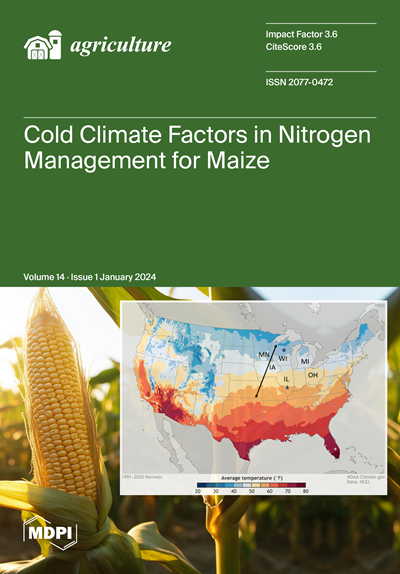Surveying North American Specialty Crop Growers’ Current Use of Soilless Substrates and Future Research and Education Needs
IF 3.6
2区 农林科学
Q1 AGRONOMY
引用次数: 0
Abstract
Many specialty crop growers are transitioning high-value crops from in-ground production to soilless culture due to the diminishing availability of fumigants, increasing pest pressure, extreme weather, and the need for flexible production practices. The objective of this study was to determine the research and educational needs of specialty crop growers who are transitioning to soilless substrates. North American growers were surveyed using an online instrument that incorporated Likert-type statement matrices, open-ended questions, and demographic questions. Additionally, two virtually led focus groups were conducted to further expand upon the quantitative findings with descriptive data. Respondents indicated the most important factors in considering whether to adopt soilless substrates were improving, managing, and reducing overall plant quality, disease management, and crop loss, respectively. The most important research needs were understanding the effects of substrates on crop quality and uniformity, fertilizer management, and economic costs and benefits/return on investment. In both the grower survey and focus groups, crop quality and uniformity were among the highest-scored responses. Food safety, disease and pest management, consumer perception, substrate disposal-related issues, transportation, and return-on-investment were also identified as important factors when considering soilless substrates.调查北美特种作物种植者目前使用无土基质和未来的研究和教育需求
由于熏蒸剂的可用性减少、虫害压力增加、极端天气以及灵活生产实践的需要,许多特种作物种植者正在将高价值作物从地下生产转向无土栽培。本研究的目的是确定正在过渡到无土基质的特种作物种植者的研究和教育需求。使用在线工具对北美种植者进行了调查,该工具包括李克特式陈述矩阵、开放式问题和人口统计问题。此外,进行了两个实际领导的焦点小组,以进一步扩大描述性数据的定量研究结果。受访者指出,在考虑是否采用无土基质时,最重要的因素分别是提高、管理和减少整体植物质量、病害管理和作物损失。最重要的研究需求是了解基质对作物质量和均匀性的影响、肥料管理、经济成本和效益/投资回报。在种植者调查和焦点小组中,作物质量和均匀性都是得分最高的回答。在考虑无土基质时,食品安全、病虫害管理、消费者认知、基质处理相关问题、运输和投资回报也被确定为重要因素。
本文章由计算机程序翻译,如有差异,请以英文原文为准。
求助全文
约1分钟内获得全文
求助全文
来源期刊

Agriculture-Basel
Agricultural and Biological Sciences-Food Science
CiteScore
4.90
自引率
13.90%
发文量
1793
审稿时长
11 weeks
期刊介绍:
Agriculture (ISSN 2077-0472) is an international and cross-disciplinary scholarly and scientific open access journal on the science of cultivating the soil, growing, harvesting crops, and raising livestock. We will aim to look at production, processing, marketing and use of foods, fibers, plants and animals. The journal Agriculturewill publish reviews, regular research papers, communications and short notes, and there is no restriction on the length of the papers. Our aim is to encourage scientists to publish their experimental and theoretical research in as much detail as possible. Full experimental and/or methodical details must be provided for research articles.
 求助内容:
求助内容: 应助结果提醒方式:
应助结果提醒方式:


